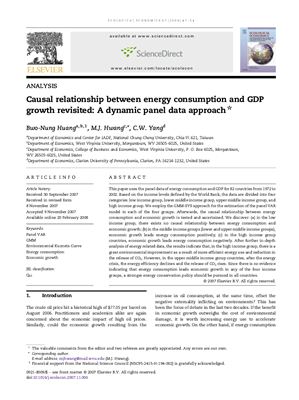На английском языке. Статья опубликована в ж. Ecological Economics,
2008, V. 67, P. 44-55.
This paper uses the panel data of energy consumption and GDP for 82 countries from 1972 to 2002. Based on the income levels defined by the World Bank, the data are divided into four categories: low income group, lower middle income group, upper middle income group, and high income group. We employ the GMM-SYS approach for the estimation of the panel VAR model in each of the four groups. Afterwards, the causal relationship between energy consumption and economic growth is tested and ascertained. We discover: (a) in the low income group, there exists no causal relationship between energy consumption and economic growth; (b) in the middle income groups (lower and upper middle income groups), economic growth leads energy consumption positively; (c) in the high income group countries, economic growth leads energy consumption negatively. After further in-depth analysis of energy related data, the results indicate that, in the high income group, there is a great environmental improvement as a result of more efficient energy use and reduction in the release of CO
2. However, in the upper middle income group countries, after the energy crisis, the energy efficiency declines and the release of CO2 rises. Since there is no evidence indicating that energy consumption leads economic growth in any of the four income groups, a stronger energy conservation policy should be pursued in all countries.
This paper uses the panel data of energy consumption and GDP for 82 countries from 1972 to 2002. Based on the income levels defined by the World Bank, the data are divided into four categories: low income group, lower middle income group, upper middle income group, and high income group. We employ the GMM-SYS approach for the estimation of the panel VAR model in each of the four groups. Afterwards, the causal relationship between energy consumption and economic growth is tested and ascertained. We discover: (a) in the low income group, there exists no causal relationship between energy consumption and economic growth; (b) in the middle income groups (lower and upper middle income groups), economic growth leads energy consumption positively; (c) in the high income group countries, economic growth leads energy consumption negatively. After further in-depth analysis of energy related data, the results indicate that, in the high income group, there is a great environmental improvement as a result of more efficient energy use and reduction in the release of CO
2. However, in the upper middle income group countries, after the energy crisis, the energy efficiency declines and the release of CO2 rises. Since there is no evidence indicating that energy consumption leads economic growth in any of the four income groups, a stronger energy conservation policy should be pursued in all countries.

